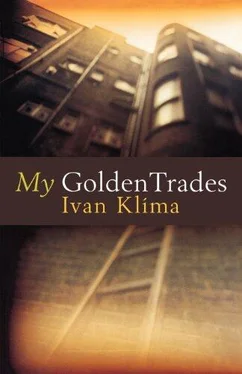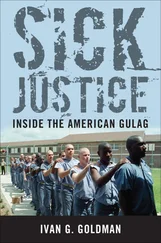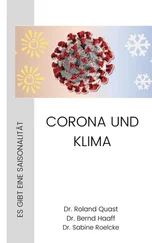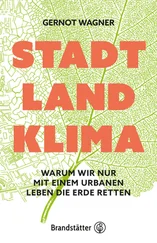Ivan Klima - My Golden Trades
Здесь есть возможность читать онлайн «Ivan Klima - My Golden Trades» весь текст электронной книги совершенно бесплатно (целиком полную версию без сокращений). В некоторых случаях можно слушать аудио, скачать через торрент в формате fb2 и присутствует краткое содержание. Год выпуска: 1998, Издательство: Granta UK, Жанр: Современная проза, на английском языке. Описание произведения, (предисловие) а так же отзывы посетителей доступны на портале библиотеки ЛибКат.
- Название:My Golden Trades
- Автор:
- Издательство:Granta UK
- Жанр:
- Год:1998
- ISBN:нет данных
- Рейтинг книги:4 / 5. Голосов: 1
-
Избранное:Добавить в избранное
- Отзывы:
-
Ваша оценка:
- 80
- 1
- 2
- 3
- 4
- 5
My Golden Trades: краткое содержание, описание и аннотация
Предлагаем к чтению аннотацию, описание, краткое содержание или предисловие (зависит от того, что написал сам автор книги «My Golden Trades»). Если вы не нашли необходимую информацию о книге — напишите в комментариях, мы постараемся отыскать её.
My Golden Trades — читать онлайн бесплатно полную книгу (весь текст) целиком
Ниже представлен текст книги, разбитый по страницам. Система сохранения места последней прочитанной страницы, позволяет с удобством читать онлайн бесплатно книгу «My Golden Trades», без необходимости каждый раз заново искать на чём Вы остановились. Поставьте закладку, и сможете в любой момент перейти на страницу, на которой закончили чтение.
Интервал:
Закладка:
In addition to bedding and a pillow, therefore, I took some dishes, a wash-basin, an immersion heater for coffee, and a lamp with a set of jaws that allowed me to attach it to anything solid.
I had taken a job as a surveyor's assistant after receiving a letter from the office dealing with my social insurance. The letter was only five lines long:
We are returning the documents you submitted to us in support of your application for artists' social insurance. It is impossible to ascertain from these documents with any degree of certainty whether your earnings did, in fact, derive from artistic activity.
When I asked the kindly woman at the office, whom I had known for years, for an explanation, she assured me I was not alone. A new director had taken charge and decided to cut insurance to people like me.
Was that legal? I asked. And who were these people like me anyway?
The woman told me that the new director's name was Mr Král and that I had best ask him.
I didn't feel like dealing with the director. This was hardly a disaster, after all. In two years and a few weeks I'd be eligible for a pension — if I survived with my health intact, that is. Surely forty years of insurance contributions would be enough to guarantee that.
A lawyer friend put me straight. If, he explained, I did not hold some documentable job for at least a single day during those two years, I would have the same right to a pension as someone who had never done a day's work— which is to say, none at all.
So those forty years would be simply wiped away?
Just work for a single day, he assured me, and I can save your pension.
Both of us knew that no one would ever put me on a payroll for a single day.
To put off, even briefly, the moment when I would officially start my new job, I had a look around the square. Its spaciousness was a credit to the generosity of the lords of Mrdice, who had founded the town 700 years ago. From where I stood, the square broadened to a point about two-thirds down its length where a baroque church emerged from a screen of century-old lime-trees. Even from a distance, I could see that the church was as shabby as all
the other buildings on the square. In front of it, in an area where they had probably held markets in the past — since the town, as I had read at home, had once been renowned for its grand horse markets — they had placed, with an aesthetic sensitivity typical of the present town fathers, an open-air bus station. Beyond a row of houses at the far end of the square rose a baroque roof with turrets, a small château, perhaps. I was delighted, because when I'd accepted this job, I had thought of Kafka's Castle and K. the surveyor.
I looked in through the glass door of a shop. Behind the counter stacked with stationery supplies a long-haired, bespectacled creature was staring back at me. I averted my eyes. Above the filthy windows, I could recognize the remains of a laurel-leaf festoon, betraying the building's origins in the Napoleonic era.
The girl in the stationery shop kept watching me, so I moved along to the main entrance to the building. Someone had fastened a piece of wrapping-paper to the door with three tacks. On it, written with a magic marker, was a sign indicating that the surveying office was on the third floor. I entered, walked down a dark corridor, then up an even darker staircase that led to a glassed-in balcony overlooking a courtyard. Various doors opened on to the balcony. Everything was big, dirty and decrepit. Outside one of the doors, an old kitchen stove was gathering rust, and beside it there was a bucket full of water.
I knocked on the door, opened it and went inside to find myself in a large, gloomily lit room. There was nothing in it but a new kitchen stove, a bag of cement and two flags twisted around poles leaning against a brightly coloured washbasin. The air had an acrid smell to it, like the air in a
pub urinal. A grimy film covered the window, making the light that came through it seem grey. The ancient floorboards were covered in cement dust. Two halves of a French-window were leaning against the wall to my left. And suspended from the ceiling in the dead centre of the room hung a single strand of electrical wire with part of the insulation burnt away. It brought to mind another room where I had been compelled to spend a part of my childhood during the war. The similarity horrified me.
I stepped into the next room through an opening in the side wall. There, seated at a table that was missing one leg, was a young man with short cropped hair. Behind him, I could see a camp-bed, some chairs, several crates of various sizes, a green metal container shaped like a bomb, a pair of rubber boots, a suitcase, and an electrical cable nailed to the wall.
The young man got up to greet me. He was about as tall as me, but thinner. I introduced myself.
He offered me his hand and said that his name was Kos. He hoped we'd get along. Had I done this kind of work before? he asked.
I told him the truth, that I hadn't, but that I came from a family of engineers, and that perhaps surveying wouldn't be completely alien to me. I had experience working in the garden, I said, adding quickly that I realized the work he was expecting me to do was different.
We returned to the first room together, and I opened a window that had not been washed, and possibly not even opened, for many years.
Was the room all right? he asked.
I replied, evasively, that it was certainly what you'd expect in a building like this, but that I didn't know what
I'd be sleeping on; I hadn't brought a mattress with me.
He assured me he'd look after everything. He'd already arranged for a bed from the old-people's home, and across the street, in an empty building earmarked for demolition, he had seen several pieces of fairly decent furniture.
I hadn't exaggerated about the engineers in my family. My father, my grandfather, my uncles and my aunts were all engineers. According to family lore, one of my aunts had been the first woman in the country to get a degree in chemical engineering. My brother is a physicist. And my son has already decided to continue the tradition — and in a completely new field, which made my father happy. I was the only defector. Not because I was afraid of theory — my mathematics professor found it incredible that I decided to study the humanities — but I couldn't relate to technology, and most of its creations scared me.
We went down to the square and, pushing our way past dustbins and empty orange crates, entered one of the buildings that, from the outside at least, looked no worse for wear than those around it. Its former inhabitants had obviously moved out some time ago. The floor was strewn with old magazines and letters, shards of glass, odd socks and torn underwear. There was a pair of ragged slippers lying beside a small cupboard with its door ripped off to reveal shelves with a few small cups and cheap plates covered in dust. My eye was immediately caught by two kitchen chairs. One had a broken back rest, but the other seemed in good repair. We set both of them aside, then emptied the useless dishes out of the cupboard — and thus I acquired the furniture I needed.
'We'll be out every day anyway,' said the surveyor. We packed our booty into the four-wheel drive, a station
wagon manufactured in Romania with the name of my new employer in fresh paint on its grey-green doors. It looked as though it could self-destruct at any moment. We got in and drove off to fetch my bed.
The old people's home was located in the old chateau; its long corridors swarmed not with courtiers, lackeys, princes and princesses, but old men and women wearing the same kind of slippers I had just seen in the abandoned flat.
My new boss asked me to wait while he went to the office and signed for the bed. I leaned against a parapet and looked out into the courtyard, where red and butter-coloured roses were blooming beside a pathway of yellow sand. Several old women were sunning themselves on a bench against the wall.
Читать дальшеИнтервал:
Закладка:
Похожие книги на «My Golden Trades»
Представляем Вашему вниманию похожие книги на «My Golden Trades» списком для выбора. Мы отобрали схожую по названию и смыслу литературу в надежде предоставить читателям больше вариантов отыскать новые, интересные, ещё непрочитанные произведения.
Обсуждение, отзывы о книге «My Golden Trades» и просто собственные мнения читателей. Оставьте ваши комментарии, напишите, что Вы думаете о произведении, его смысле или главных героях. Укажите что конкретно понравилось, а что нет, и почему Вы так считаете.












